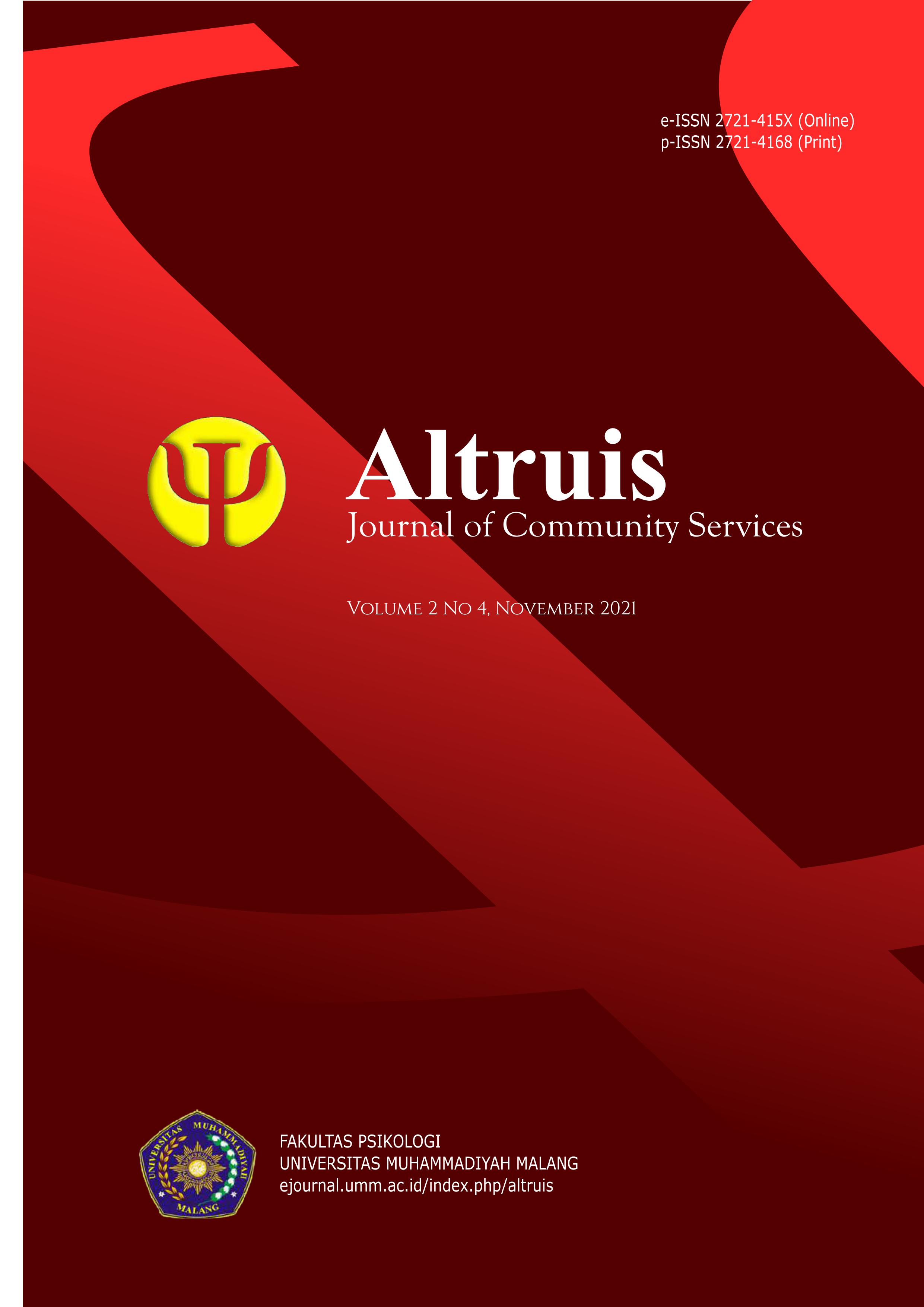Kebijakan dan Implementasi Program Pelatihan Kejuruan bagi Anak Jalanan di Kabupaten Subang
DOI:
https://doi.org/10.22219/altruis.v2i4.17947Keywords:
Kebijakan; Implementasi; Anak Jalanan; Pelatihan Kejuruan.Abstract
The increasing number of street children in Subang Regency became a social problem that it raised questions about the government’s role in handling street children. The purpose of this research was to examine the policy and implementation of the Subang Regency Social Services program in fostering street children through vocational training, as well as to examine the problems of implementing vocational training, and what attempts were made to
overcome these problems. The theory of constructivism supported this research because it was expected that street children would be able independently to form the knowledge that has been previously acquired and then combined it with the new knowledge gained in vocational training. This research procedure used a qualitative descriptive method
in the form of case study research. The results of the research on program policies and the implementation of vocational training for street children were not carried out directly at the Social Services, due to several problems, including limited budgets, Regional Regulations have not been published yet and inadequate infrastructure, so that it needed an attempt to overcome the problems that was collaboration with Ministry of Social Affairs that was
PPSBR institution (Panti Pemberdayaan Sosial Bina Remaja) which is located in several cities/districts. In conclusion, the policy of the Subang Regency Social Services program is not capable to realize coaching optimally through vocational training for street children.
Downloads
References
Amal, Bakhrul Khair. (2003) Pemberdayaan Anak Jalanan melalui Rumah Singgah : Studi Kebijakan Penanganan Anak Jalanan di Indonesia. Tesis S2, Fakultas Ilmu Sosial dan Ilmu Politik.
Bagong, Suyanto. (2005). Tindak Kekerasan Terhadap Anak: Masalah dan Upaya Pemantauannya, Kerjasama LPA Jatim dan UNICEF. November, 20, 2019, https://scholar.google.co.id/scholar?citations?user=t_KG0I8AAAJ&hl=id
Bridgman, P. & Davis, G. (2000). Australian Policy Handbook. Allen & Unwin : Book Publishers. November, 25, 2019 https://www.allenandunwin.com/browse/books/academic-professional/politics-government/The-Australian-Policy-Handbook-Catherine-Althaus-Peter-Bridgman-and-Glyn-Davi
Indonesia. Undang-Undang Dasar. (1945).
Indonesia. Undang-undang Perlindungan Anak. Nomor 35 (2014).
Indonesia. Undang-undang Sistem Pendidikan Nasional. Nomor 20 (2003).
Indonesia. Tentang Pedoman Penyelenggaraan Pelatihan Berbasis Kompetensi. Nomor 08 (2014).
Macionis, J. John, (2006). Society The Basics (Eight Edition). November, 21, 2019 https://www.academia.edu/39286407/Society_The_Basics_14th_Edition_by_John_J._Macionis
Miles, M.B., Huberman, A. M., dan Saldana, J. (2014). Qualitative Data Analysis, A Methods Sourcebook, (third edition). USA : Sage Publications. Terjemahan Rohendi, UI-Press.
Mulyana. Deddy. (2000). Metodologi Penelitian Kualitatif. Bandung : PT Rosdakarya.
Muridan., U., et al. (2010) “Teori Diri Sebuah Tafsir Makna Simbolik (Pendekatan Teori Dramaturgi Erving Goffman),” Komunika Jurnal Dakwah dan Komunikasi, 4 (2), 10-12
Ritzer, George. (2012) Teori Sosiologi (Edisi Kedelapan) (Yogyakarta: Pustaka Pelajar.
Setiawan, ahri Harjanto. “Mencegah Menjadi anak jalanan dan mengembalikannya kepada keluarga melalui model community based” ” Jurnal Penelitian dan Pengembangan Kesejahteraan Sosial. 12 (2). 34-38
Sholihah, Hani. (2018). “Perlindungan Anak dalam Perspektif Hukum Islam” Journal for Islamic Studies. 1 (2), 48-49.
Suradi. “Permasalahan dan Penanggulangan Anak Jalanan di Bandar Lampung” Jurnal Penelitian dan Pengembangan Kesejahteraan Sosial. 16 (3), 17-19
Surbakti, (2005). Pembinaan Anak Jalanan Melalui Rumah Singgah Dinas Sosial Provinsi Jatim, Tesis S2, Surabaya : Dinas Sosial Provinsi Jawa Timur.
Thoha, Miftah. Pembinaan Organisasi : Proses Diagnosa dan Intervensi Jakarta: PT. Raja Grafindo Persada.
Downloads
Published
How to Cite
Issue
Section
License
Copyright (c) 2021 Tera Ummuttaufiqoh

This work is licensed under a Creative Commons Attribution-ShareAlike 4.0 International License.
Authors who publish in Altruis agree to the following terms:
- For all articles published in Altruis, copyright is retained by the authors. Authors give permission to the publisher to announce the work with conditions. When the manuscript is accepted for publication, the authors agree to automatic transfer of the publishing right to the publisher.
- Authors retain copyright and grant the journal right of first publication with the work simultaneously licensed under a Creative Commons Attribution-ShareAlike 4.0 International License that allows others to share the work with an acknowledgment of the work's authorship and initial publication in this journal.
- Authors are able to enter into separate, additional contractual arrangements for the non-exclusive distribution of the journal's published version of the work (e.g., post it to an institutional repository or publish it in a book), with an acknowledgment of its initial publication in this journal.
- Authors are permitted and encouraged to post their work online (e.g., in institutional repositories or on their website) prior to and during the submission process, as it can lead to productive exchanges, as well as earlier and greater citation of published work (See The Effect of Open Access).
This work is licensed under a Creative Commons Attribution-ShareAlike 4.0 International License.


